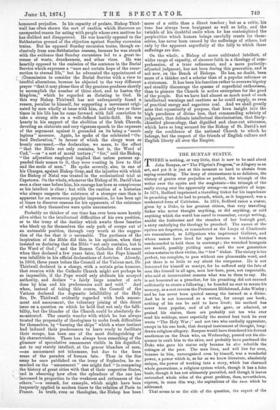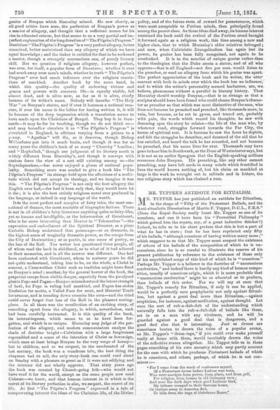THE BUNYAN STATUE.
THERE is nothing, or very little, that is new to be said about John Bunyan, or "The Pilgrim's Progress," or Allegory as an art, and yet it is just at this moment so hard to abstain from saying something. The irony of circumstance is so delicious, the victory of genius over prejudice so perfect, the triumph of the writer over the squire and the magistrate—the triumph of the really strong over the apparently strong—so suggestive of hope. In 1674, Bedford imprisoned a travelling tinker for his impudence in preaching what he had to preach, which, as it happened, was a moderated form of Calvinism. In 1874, Bedford raises a statue, given by a Duke, to her greatest citizen, that very travelling tinker who never thought anything, or did anything, or said anything which the world has cared to remember, except writing, amidst the foulnesses and the stenches of her borough gaol, a story embodying the theology he preached. The names of the squires are forgotten, or remembered as the Lucys of Charlecote are remembered, as Lilliputians who imprisoned Gulliver, and whose names have lived for ages because a butcher's man condescended to hold them in contempt ; the wretched bourgeois are mould, possibly yielding coin; and the new generation raises a statue to their victim, the " low " tinker. The victory is too perfect, too complete, to pass without one pleasurable word, and yet there is so little to say about the conqueror. Ile is not honoured for himself as martyr, for he suffered only the fate of men like himself in all ages, men low-born, poor, not respectable, who said at inconvenient seasons what was in them to say. lie is not honoured as a preacher, for his preaching did not succeed sufficiently to create a following ; he founded no sect to revere his memory, as a sect reveres the Protestant Hildebrand, John Wesley ; and he has never been quoted among the learned as a divine. And he is not honoured as a writer, for except one book, nothing of his can be said to have lived ; his method has never been popular, and of all who gave, or admired, or praised his statue, there are probably not ten who ever read his writings, more especially the second best book he ever wrote "The Holy War ;" and not two who cordially appreciate, except in his one book, that decayed instrument of thought, long- drawn religious allegory. Bunyan would have thundered his fiercest anathemas on the Dean who, on Wednesday, poured out his elo- quence to exalt him to the skies, and probably have pardoned the Duke who gave his statue only because he also rebuilds the cottages of the poor. The man lives, and will live for ever, because in him, unrecognised even by himself, was a wonderful power, a power which is, as far as we know literature, absolutely unique, the power of working into a story, which has charmed whole generations, a religious system which, though it has a false basis, though it has not ultimately prevailed, and though it leaves untouched whole sides of the great problem, does, nevertheless, express, in some dim way, the aspirations of the race which he addressed.
That seems to us the side of the question, the aspect of the genius of Bunyan which Macaulay missed. He saw clearly, as all good critics have seen, the perfection of Banyan's power as a master of allegory, and thought that a sufficient reason for his rise in educated esteem, but that seems to us a very partial and im- rerfect explanation of the long duration of "The Pilgrim's Progress." Doubtless "The Pilgrim's Progress" is a very perfect allegory, better conceived, better maintained than any allegory of which we have equal knowledge ; and the tinker is entitled for that to be reckoned a master, though a strangely unconscious one, of purely literary skill. But we question if religious allegory, however perfect, was ever, for itself, a popular form of literature ; whether it ever had much sway over men's minds, whether in truth" The Pilgrim's Progress" ever had much influence over the religious convic- tions of mankind. Another book by the same hand, in which this quality—the quality of endowing virtues and graces and powers with concrete life—is equally 'visible, fell almost dead, and is alive now, as fur as it is alive, chiefly because of its writer's name. Nobody will inscribe "The Holy War" on I3unyan's statue, and if ever it becomes a national trea- sure, if ever his name is the loftier for having written it, it will be because of the deep impression which a translation seems to have made upon the Christians of Bengal. They buy it in thou- sands—it may be for its teaching, though we do not think so— and may hereafter circulate it as "The Pilgrim's Progrcss " is circulated in England, in editions varying from a guinea to a p-nny. " Agathos " will die, as it deserves, though Bishop Wilberforce put into it much brain, and though it was for so many years the children's book of so many " Churchy " families ; and " Hephzibah," though our judgment of its literary merit is widely different from Macanlay's, and though it conveys with curious force the view of a sect still existing among us—the Sapralapsarians,—has never enjoyed a gleam of national popu- larity. Something more was needed to give a book like "The Pilgrim's Progress" its strange hold upon the affections of a multi- tude which did not accept its theology, and we imagine it was this. "The Pilgrim's Progress" is not only the best allegory the English ever had,—for had it been only that, they would have let it die ; it is also the beet strictly religious novel ever produced in the language, or indeed in any language of the world.
It•is the most perfect and complex of fairy tales, the most sen- sational of dramas, the most readable of biographic fictions. There is not in all children's fairy literature anything quite so fairy-like, yet so human and intelligible, as the intervention of Greatheart, who is far more interesting than Mentor in "Telemachus "—the expression and embodiment of the Spiritual Director, as a pious Catholic Bishop understood that personage—or so dramatic, in the highest sense of tragically dramatic power, as the escape from the City of Destruction ; or so poetic, in one sense of poetry, as the loss of the Roll. The writer has questioned three people, all of whom read the book in childhood, as to what of it had adhered to their memories, and in all the answer was different. One had been enchanted with Greatheart, whom in maturer years he did not quite understand, taking him to be, on the whole, a Christ in armour, a Cromwellian Christ such as tradition might have fixed on Banyan's mind ; another, by the general horror of the book, the perpetual escape from visible danger, especially from the paralysed giants Pope and Pagan—Bunyan misunderstood the latent strength of both, for Pope is ruling half mankind, and Pagan has stolen Evolution for motto, a Veiled Face for crest, and Material Truth for armour, and is treading down enemies like corn—and the third could never forget that ion of the Roll in the pleasant resting- place. In all there was the recollection of an exciting story, of something apart from the allegory, in which, nevertheless, each Lad been carefully instructed. It is this quality of the book, its interestingness, which seems to us to have been for- gotten, and which is so unique. Macaulay may judge of the per- fection of the allegory, and modern commentators analyse the shade of doctrine taught—Calvinism with a large forgiveness superadded and a sense of the intention of Christ as Sovereign, which once at least brings Bunyan to the very verge of heresy— but to children, and as we suspect, to the uneducated of the lust century, the book was a wondrous tale, the beat thing the chapman had to sell, the only story-book one could read aloud on Sunday with a pleasure as great as if it were not edifying and the minister did not wholly approve. That sixty years ago the book was coveted by Church-going folk—who would not have read it for the world, except as the same people now read Colenso—we know, and that human interest in it which is the secret of its literary perfection is also, we suspect, the secret of its life. At first "The Pilgrim's Progress" expressed in a tale of overpowering interest the ideas of the Christian life, of the Divine
policy, and of the future state of reward for perseverance, which were most acceptable to Puritan minds, then principally found among the poorer class. As those ideas died away, its human interest sustained the book until the revival of the Puritan creed brought it forward again as a religious work, this time among a new and higher class, that to which Macaulay's elder relatives belonged ; and now, when Calvinistic Evangelicalism has again lost its power, its genius has been fully recognised, not again to be overlooked. It is to the novelist of unique genius rather than to the theologian that the Duke erects a statue, and of all who approve—that is all England—not five per cent, would listen to the preacher, or read an allegory from which his genius was apart. The perfect appreciation of the book and its writer, the utter content with both in minds over which the book has no influence,- and to which the writer's personality seemed barbarous, are, we. believe, phenomena without a parallel in literary history. That Macaulay should worship Banyan,—that is as strange as that a sculptor should have been found who could choose Bunyan's charac- ter as preacher as that which was most distinctive of the man, who lives not because he preached and preached, like thousands more, in vain, but because, as he eat in gyves, and traced out, probably with pain, the words which record his thoughts, he saw with dreaming eyes the story he relates—the life of the man who, by whatever road, struggles forward towards the Far City, the haven of spiritual rest. It is because he saw the faces he depicts, and felt the struggles he describes, and dreamed of the aid that he has extolled, and heard the talk he has recorded, and not because he preached, that his name lives for ever. Thousands may have gone to hear him in South wark, as the Dean of Westminster says, but it is not as an earlier Spurgeon that the English-speaking millions reverence John Bunyan. His preaching, like any other earnest preaching, may have left seeds in many minds which fructified in lives the world knows nothing of, but his claim on mankind at large is the work he wrought out in solitude and in fetters, the one religious story which has chained a race.



































 Previous page
Previous page